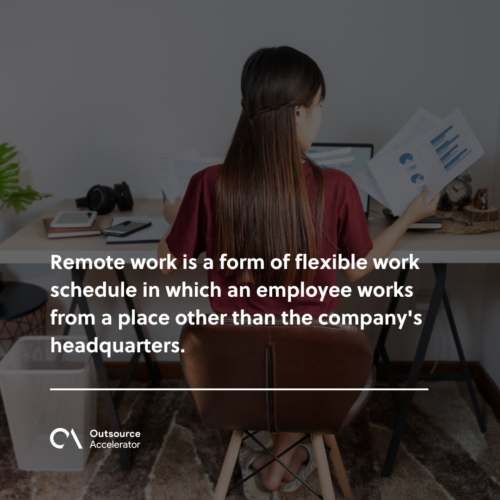Remote Work
Definition
What is remote work?
Remote work is a form of flexible work schedule in which an employee works from a place other than the company’s headquarters. Remote work is also known as work from home (WFH) or telecommuting.
Remote working arrangements may take place temporarily or permanently, partially or full-time, and occasionally or continuously. Remote work includes equipment management policies, network protection, and standards of efficiency.
Some common reasons why companies are embracing remote working are:
- As COVID-19 forced businesses worldwide to send their workers home to work virtually, remote work took off.
- Getting access to a broader spectrum of work opportunities that are not geographically restricted
- Remote work contributes to a wide range of sustainability programs, including economic prosperity and environmental issues.
How to implement remote work?
The principle of remote working has progressed significantly. In its beginning phases, it was primarily limited to small start-ups without physical offices.
Today, employees can function and perform their job responsibilities in the way that best suits their lives and individual schedules – that is the essence of remote work.
While it took some time to adapt to the new normal, employers recognized that creating a stable framework was key to a successful long-term, flexible working routine. Due to this, they introduced and utilized video conferencing, new technologies, and the right strategies to work much efficiently.
Maintaining compliance is essential
Adapting to the emerging reality of a telecommuting system often necessitates a change in how enforcement policies are handled. It is much more complicated for businesses with a multinational workforce, as they would have to comply with both their own country’s laws and those of the countries where their workers live and work.
Efficient HR participation
Include the HR staff in the implementation of all workforce management plans as early as possible. It’s crucial to assist departments in communicating their workforce management strategies to all of their employees.
Implementing consistency and productivity plan
Setting specific objectives and other key performance indicators (KPIs) is critical. It allows you and your team to agree on the outcomes you want to achieve.
Employees can monitor their progress toward pre-determined goals and, as a result, achieve their objectives. It also keeps them organized by letting them know how far they’ve come.
Risks to data protection
Employees working from home, increased usage of unauthorized computers, unreliable or public Wi-Fi networks, and other factors raise the likelihood of confidential data being compromised.
It can be challenging to enforce cybersecurity protections across several home office locations while still monitoring employee activities without compromising their confidentiality.
Why do companies choose remote work?
The global pandemic caused us to change our work system in many areas, such as moving from the workplace to remote working.
Some office and meeting tasks that are typically carried out offline and entail a long process can now be substituted with virtual activities thanks to advances in information and communication technology (ICT).
Improve employee’s work-life balance
Many remote jobs often have flexible hours, ensuring that employees can start and end their days anytime once the work is completed and results in positive outcomes.
When it comes to attending to your personal life needs, having leverage over your work schedule can be invaluable.
Overall, remote employees report feeling less depressed and concentrating and completing their work more quickly as a result.

Remote work leads to significant company savings
Remote work strategies can dramatically reduce IT and real-estate costs, allowing businesses to find and retain professional workers in less competitive and lower-cost locations.
Reduced stress from daily commute
Employees who work from home will save money from gas, car repairs, housing, parking fees, and other expenses that may all be cut down or eradicated. These small sums add up to more money in your pocket.
Employees who work from home tend to start their days early to reduce travel time, and they are more likely to work later into the night because their office is always just a few steps away.
Sustainability and positive environmental impact
Remote work contributes to several sustainability initiatives, including economic growth and lower inequalities, ecological conservation, climate change, and waste reduction.
Making environmentally friendly decisions, such as using less paper and closely tracking their air conditioning, heating, and lighting can help the climate.
In a remote work strategy, communication is crucial
A solid communication strategy is at the heart of every good remote work plan. Every day, leaders must make it clear to their employees what they expect from them. It’s important to define roles, duties, and deadlines clearly.
The difficulties of implementing a remote work
- Access to appropriate technologies is restricted, as is timely access to technical support.
- Employees can experience feelings of isolation as a result of a lack of teamwork and socialization.
- Employees’ lack of team collaboration and communication can result in information lost in the translation.
- Difficulty disconnecting from work or sustaining a work-life balance
- HR administrators and corporate leaders have a difficult time managing company culture.
- HR will face problems where there is a disconnect in hiring and training new talent in the training and growth processes.








 Independent
Independent




